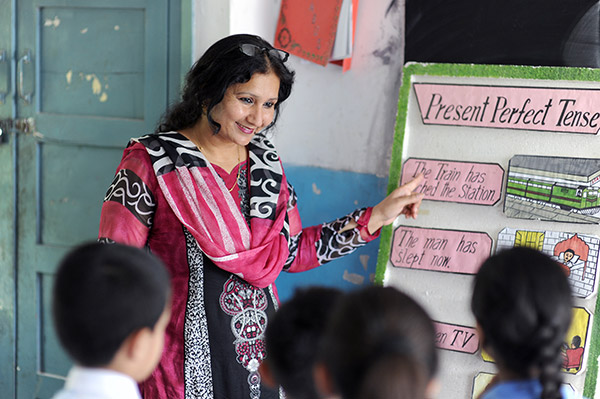
Islamabad –Investments in education from Pakistan’s national government and the international community have led to a steady rise in the country’s literacy rate over the last ten years—climbing from 36 percent in 1992 to 58 percent in 2013. Despite these improvements, the provision of quality education for all remains a challenge.
In 2013, almost 50 percent of fifth grade students could not read simple, grade two level story text in the language of school instruction, according to the Annual Status of Education Report Survey 2013. The World Bank’s 2014 survey of low performing districts in Punjab revealed that student learning is dependent on teacher performance.
With the recent introduction of the Associate Degree and Bachelor’s in Education programs, pre-service training in Pakistan has undergone a rapid transformation. However, until recently these programs lacked the content and training needed to prepare new teachers to teach reading effectively at the early grade level.
To overcome these challenges, students and educators require a teacher training transformation. Early grade reading instruction must be built into the basics of educator preparation.
Developing and piloting reading instruction in pre-service training
Heeding this call, for the first time in the country’s history, Pakistan’s Higher Education Commission is now working to integrate reading instruction coursework for aspiring teachers in both the Associate degree and Bachelor’s in Education degree programs.
The Pakistan Reading Project—a nationwide program aimed at improving the quality of reading education in 23,800 public and private schools—is working closely with the Higher Education Commission to design and test the new pre-service pilot program.
This pre-service program is developing and integrating reading content in five courses for the first two years of the each degree program, and a specialized reading discipline for the last two years of the Bachelor’s in Education program.
Funded by the U.S. Agency for International Development and the American people, the Pakistan Reading Project is implemented by the International Rescue Committee, Creative Associates International and other local and international partners.
A new challenging & rewarding frontier
The process of developing and rolling out the pilot has been both challenging and immensely rewarding.
It has been challenging because the process has involved a steep learning curve for all stakeholders—the Teacher Training Institutes, the curriculum writers and the Higher Education Commission to name a few.
With the recent introduction of the Associate Degree and Bachelor’s in Education programs, pre-service training in Pakistan has undergone a dramatic shift. Universities and colleges are now expected to take on much greater responsibility in the form of increased quality control, new assessment strategies, an extensive practicum component and more school-based assignments.
Further, reading as a field itself is new in Pakistan. It has taken time, effort and intensive consensus-building to raise awareness of the importance of reading as a discipline among various stakeholders, and for them to take ownership of the intervention.
The pre-service pilot program in reading instruction has also been incredibly rewarding. It is a testament to what one can accomplish when development actors work in close partnership with the government to achieve a common goal. In eight teacher training institutes across Pakistan, the program piloted five reading-integrated courses—teaching literacy, classroom assessment, teaching Urdu, teaching English and a practicum.
Collaboration with Pakistan’s Higher Education Commission has been critical to the successful roll-out of the pre-service pilot program. From the outset, Higher Education Commission partners have been closely involved in the development and execution of the pilot work plan.
They joined the Pakistan Reading Project pre-service team in researching reading standards and what has worked in other contexts, before charting a plan for integrating reading assessment into existing pre-service coursework and developing a reading discipline within the existing teacher education program.
The Pakistan Reading Project and the Higher Education Commission have worked together to build the capacity of teacher training institute faculty across the country to develop reading courses that work for their given context. While the project team provided technical input into the content of the trainings, the Higher Education Commission initiated and hosted more than five reading curricula design workshops.
The Commission’s involvement also helped create buy-in for reading reform among stakeholders who were initially reluctant. For instance, they were able to assist the project in securing approval from the National Curricula Review Committee for the new reading curricula.
A budding culture of reading
While it is too early to predict the outcome of the pilot program itself, it has been heartening to see a growing consensus on the importance of reading emerge from the reading curricula design workshops themselves.
By selecting course writers from target universities and connecting them to national and international reading experts, the Pakistan Reading Project has been able to provide the writers with on-the-job support, create good will for the initiative and build in a commitment to improving reading outcomes in Pakistan.
The approach has been so successful that the pilot has expanded from four original institutes to eight. Faculty who participated in Reading Curricula Outline workshops have initiated new research on reading at their universities.
This pilot is already demonstrating positive results. During recent focus group discussions with student teachers and interview of faculty, it was observed that all stakeholders of pilot teacher training institutes are taking a significant interest in teaching and learning these new courses. The reading content evaluation shows that more than 90 percent of students and teachers are satisfied with the reading content course, and that the recent integration has provided them with a deeper insight into teaching reading.
This represent a significant positive step forward for early grade reading globally! As we gather more evidence from Pakistan, we can help enrich the body of national and international research on reading, and raise greater awareness about its importance in early grades.
Shahida Maheen is the Pre-Service Reading Advisor for the Pakistan Reading Project.
The project is funded by the American people through the U.S. Agency for International Development and implemented by the International Rescue Committee, Creative Associates International and other local and international partners.

